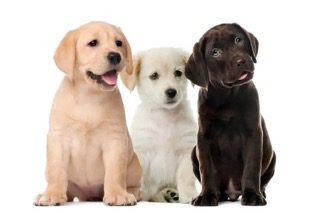
The Labrador Retriever is a large, friendly and active breed originating from Newfoundland and Labrador, Canada. Historically bred as a working gundog, the Labrador Retriever has since become one of the most popular dogs in North America and the United Kingdom. They are medium to large in size with a strong, muscular build and furry, water-resistant coats, often sporting a unique “otter-tail”.
They have a broad head with a distinctive black nose, medium-sized droopy ears, expressive brown or hazel eyes and a thick neck. Their coats typically come in short, dense and straight hair with many variations in solid colors such as black, yellow, and chocolate. Some Labradors may also have white markings, as well as slight feathering along the back of their legs and tail.
What makes them so special is their lively, loyal and energetic personalities, and their willingness to please and work hard. Labrador Retrievers are incredibly intelligent dogs, making them excellent companions for the outdoors. With proper guidance and training, they excel at a variety of dog sports and activities. As one of the most popular breeds, the Labrador Retriever is an ideal breed for novice and experienced dog owners alike.
Labrador Retrievers are a popular and energetic breed of dog. They need a healthy mix of lean proteins, carbohydrates, and fats. A balanced daily diet should consist of 10-12% protein and 17-20% fat. They also need a balanced daily nutrient intake of vitamins and minerals. To keep their bones and teeth strong, it is important to include foods that are high in calcium and phosphorous in their meals. Additionally, feeding them a variety of natural sources of omega-3 and 6 fatty acids can have many positive health effects.
It is important to make sure that a Labrador Retriever is getting the right nutrition, as proper nutrition can be the difference between a healthy and an unhealthy dog. Responsible ownership is required to provide the necessary care and attention to ensure your pet is receiving a well-balanced and complete diet for optimal health. Ensuring that your Labrador Retriever is fed a proper diet can help keep them healthy throughout their life.
Take your time to educate yourself on the proper care needed and the nutritional requirements for your Labrador Retriever. Make sure to check out Way Canina for more detailed information, which can help you determine what foods are okay and what others to avoid, as well as additional feeding guidelines and advice.
A Labrador Retriever is a very friendly and intelligent breed of dog that requires plenty of exercise and companionship. Common health problems include hip and elbow dysplasia, obesity, eye disorders, and food sensitivities. Regular veterinary check-ups, vaccinations, and preventive care are critical to maintaining their health. Labrador Retrievers need to be brushed and bathed regularly to keep their coats in good condition. They also need their ears checked regularly to prevent infection.
With proper care and nutrition, Labs have a lifespan of between 10 and 12 years. Genetics, diet, exercise, and healthcare play a key role in their longevity. Regular veterinary visits, healthy diet, and exercise can help them to live a long and healthy life.
Are you considering a Labrador Retriever for a pet? Before making a decision, it’s important to consider the pros and cons of owning this breed of dog – along with the responsibilities of caring for a pet. At Way Canina, you can compare different breeds to find out more about the health and wellbeing of your potential pet. Be sure to check them out for additional information.
To summarize, Labrador Retrievers require a healthy mix of proteins, carbs, fats, vitamins, minerals, and other nutrients to stay healthy. Responsible ownership is key to make sure that they are getting the proper nutrition, and Way Canina can provide more detailed information to help you give your pet the best.